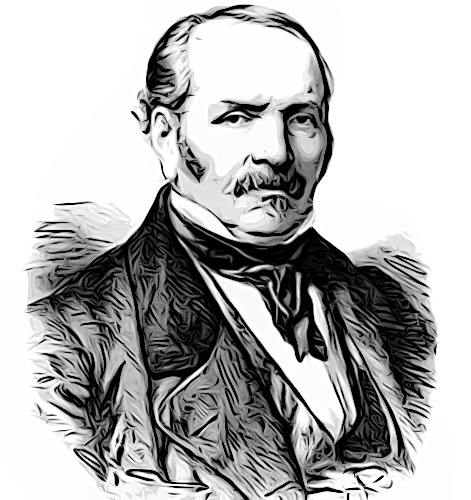
Hippolyte Léon Denizard Rivail, who later adopted the pseudonym Allan Kardec, was born in Lyon, France, on October 3, 1804. Son of Jean-Baptiste Antoine Rivail and Jeanne Louise Buhamel, descendants of traditional Catholic families from Lyon.
Rivail began his studies in his hometown and showed an inclination for the study of sciences and philosophy from a young age. At the age of 10, he was taken to the famous Pestalozzi Educational Institute in Yverdon, Switzerland, where he studied until graduating in Science and Letters in 1822, then moving to Paris.
In Paris, Rivail worked as a translator, primary school director, and in 1826, he founded his own technical institute following Pestalozzi’s teaching methods. He received assistance from Amélie-Gabrielle Boudet, a teacher who became his wife and loyal companion in 1832.
Professor Rivail wrote several didactic books, actively participated in political discussions about French educational reform, and was a member of various scientific societies in France. He was an advocate of democratizing education and even offered free classes at his own home in Paris, alongside Amélie-Gabrielle.
In the 1850s, an event impressed Europe and caught Rivail’s attention: the “table-turning”. It involved a phenomenon where tables would fly and rotate in the air without any physical support. However, Rivail did not immediately accept the phenomenon but studied it attentively with a rigorous scientific method. Eventually, he observed that there were indeed intelligent forces from the invisible world that manifested through the “tables”, thus initiating communication with Superior Spirits.
By improving the means of communication with Superior Spirits through “mediumistic writing” (psychography) provided by dedicated mediums, Professor Rivail asked hundreds of questions to them. He analyzed, compared, and codified their answers, subjecting everything to reason, not accepting or disseminating anything that did not pass this filter. Thus, on April 18, 1857, “The Spirits’ Book” was born, which Professor Rivail codified under the pseudonym Allan Kardec.
The choice of the pseudonym arose from a revelation made by one of the Spirits guiding the spiritual work, stating that he already knew Rivail from another life when he was a druid in the region of Gaul, named Allan de Kardec. Following his intuition, Rivail decided to relinquish his well-known professional identity to become Allan Kardec in the dissemination of Spiritist works.
Spiritism is based on five “basic books”, called the Spiritist Codification, published by Allan Kardec between 1857 and 1868. The codification consists of: The Spirits’ Book, The Mediums’ Book, The Gospel According to Spiritism, Heaven and Hell and Genesis. There are also “complementary works,” such as What is Spiritism?, Posthumous Works, and various editions of the Spiritist Magazine.
H-L-D Rivail, our dear Allan Kardec, passed away at the age of 64 in Paris in 1869, leaving a great legacy for humanity. Allan Kardec, with the help of various mediums and dedicated workers, admirably fulfilled his mission on Earth, thus fulfilling Jesus’ promise, according to the Gospel of John, when he promised to send the Comforter, which for us Spiritists, is Spiritism.
Connected with the teachings of Jesus through Spiritism, we can understand important concepts such as the immortality of the soul, the plurality of existences (reincarnations), the nature of Spirits and their relations with human beings, the moral and progressive laws, the plurality of inhabited worlds in the universe, and the future of humanity.
Spiritism expanded to several countries after its emergence, but it was in Brazil that it achieved its most notable presence, with millions of followers and sympathizers. Its most representative organization is the Brazilian Spiritist Federation (FEB). Bezerra de Menezes (1831-1900) and Chico Xavier (1910-2002) were some of the most important exponents of Spiritism in Brazil, which continues to flourish more and more with the blessings of God.
Did you like our post? Subscribe to our newsletter and follow us on Instagram to stay informed about new content and updates.
Check out some related posts:
👉 Who Was Chico Xavier?
👉 What is Spiritism? 8 Curiosities about Spiritism.
👉 Summary on Spiritism (Part I).
👉Summary on Spiritism (PART II).
👉How did the Spirits communicate with Kardec?
